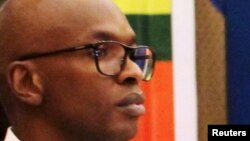Burundian Foreign Minister Alain Nyamitwe led a delegation of the foreign diplomatic corps on a tour of parts of the country Thursday as part of the East African nation’s diplomatic day.
The annual event gives diplomats a chance to see activities across the country firsthand and engage with senior government officials.
“Today we had the opportunity to go and visit the source of the Nile River in the south of Burundi in Bururi province, and later on we also visited a flagship sugar factory of Burundi, Sosumo," Nyamitwe said. The diplomats "came to know the importance of this factory in the economy of our country, and also of our region.”
The foreign minister called the trip "very significant, because it has allowed the diplomatic community to see for themselves that the country is doing well."
"You hear a lot in the media," he said. "You hear all sorts of reports that do not paint in good light the situation in the country. But this time around, they were able to see and to talk to people about the situation in the country. They have seen for themselves, and they know that you can go from point A to point B in Burundi unhindered and come back without a problem."
Critics unimpressed
Critics said the government-organized tour was a face-saving publicity stunt aimed at convincing the diplomats that the country is at peace. The effort, they said, was prompted by a recent U.N. human rights report that expressed concern about agents of the administration and militias who carry out slayings and arbitrary arrests of opponents.
The government in Bujumbura sharply rejected such accusations, saying they didn't reflect the reality on the ground. It also said the reports were aimed at undermining the administration in Bujumbura and to make President Pierre Nkurunziza and his government globally unpopular.
Opponents said the government should have allowed the diplomats to explore the country on their own to see whether it is as peaceful as the government in Bujumbura portrays.
“Tell us what is it that they want to see that they have not been able to see," Nyamitwe said. "Every time we have received a request by an embassy to go inside the country, they are allowed to do that. ... What is acceptable internationally is what is being done. We are not creating or making up things. We are doing what is acceptable internationally.”
Reports of tension denied
Nyamitwe denied reports that the country remains tense despite regional efforts to mediate efforts by the government, civil society and opposition groups to resolve Burundi's political challenges. He acknowledged that Burundi faces such challenges but insisted that reports of ethnic tension were unfounded.
“Everybody now knows that those reports were not real and they did not match the reality on the ground. We have had issues, fine, but did we have a genocide or did we have ethnic tensions at that time or today? I do not think so," Nyamitwe said.
“If you look at the political class and you look at its composition, you will find out that you would have Hutus in the opposition as you have Hutus in the government. You have Tutsis in the government as you have Tutsis in the opposition," he said. "But I don’t think it is a Hutu-versus-Tutsi kind of conflict or tension that we have today. I challenge anybody who would be in a position to prove to us that that is the case.”
Nyamitwe’s remarks came as Burundi prepares to celebrate on Friday the anniversary of its independence from former colonial power Belgium on July 1, 1962.












